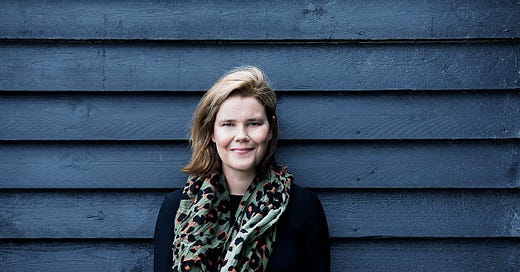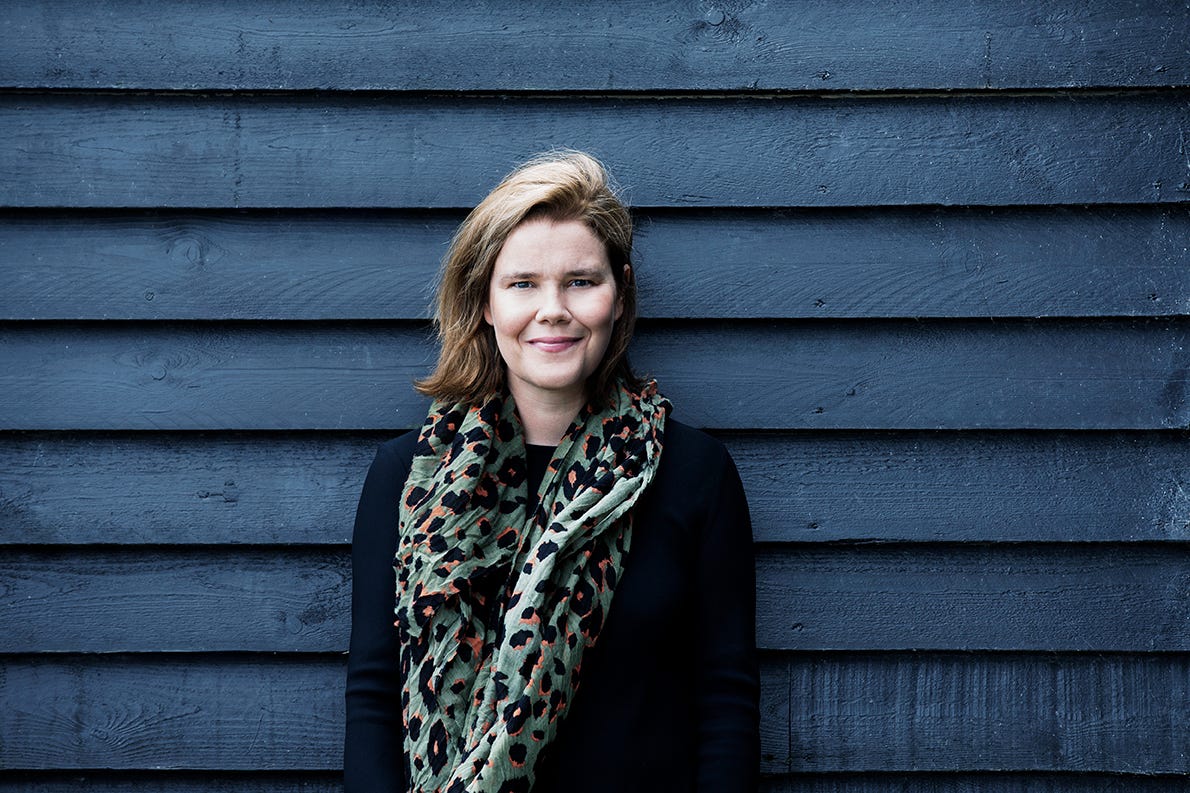#26: Putting purpose alongside profit
A Q&A with B Corp Movement Executive Director, Nille Skalts
Pass It On is a bi-weekly newsletter bringing the tech and non-profit sectors closer together through knowledge sharing, written and edited by Lauren Crichton.
Welcome to all the recent subscribers! If you're new here, why not join us:
—
Do you know what a B Corp is?
Perhaps you once spotted the (B) logo on the side of an Innocent smoothie or Body Shop bottle, and weren’t quite sure what it meant? The logo stands for certified B Corporation (aka B Corp). To qualify as a B Corp, a company must meet the highest standards of verified social and environmental performance, public transparency, and legal accountability to balance profit and purpose. In other words, they must be a pioneer for positive change.
Today, there are over 4,000 B Corps operating across 153 industries and 77 countries. How and why did they get certified, and what advantages has the certification brought to both their businesses and the planet? To find out, I got in touch with Nille Skalts, the founder and Executive Director of the B Corp movement in the Nordics. A self-proclaimed ‘wrong thinker’ and corporate activist, Nille is committed to changing the world one company at a time. In listening to her speak about the B Corp movement, I felt optimistic about the private sector in a way I hadn’t done for a long time. I hope you will, too!
Putting purpose alongside profit - with Nille Skalts
What is the essence of the B Corp movement? Why did you decide to certify your consultancy as one in 2015?
B Corp is first and foremost a movement of companies that believe in business as a force for good. It's founded on the belief that the economic system needs to change: today, companies are not working for everyone's benefit; business is working primarily to serve the shareholders with massive unintended consequences for society and the environment. That's why B Corp's mission is to create an inclusive, equitable, and regenerative economic system for all people and the planet.
What does that mean in practice? It means a new standard, certification, and legal framework for companies. In addition to undergoing a rigorous assessment, evaluation, and verification process based on over 250 questions, B Corps must legally extend their duty of care and declare their intention to serve all stakeholders, not just shareholders. Finally, they must sign the Declaration of Interdependence—a moral obligation to respect and act in the interest of our interconnectedness.
I discovered B Corp in 2014, back when the movement first started in Europe. I've always wanted to build business differently, so the movement spoke to me instantly. I strongly believe in the words of Patagonia founder, Yvon Chouinard:
"Evil doesn't have to be an overt act; it can be merely the absence of good. If you have the ability, the resources, and the opportunity to do good and you do nothing, that can be evil."
This is how I run my business.
What are the main advantages to becoming a B Corp?
Whenever I ask B Corp leaders this question, they always tell me that the certification has a catalytic impact on enhancing:
Internal culture — Aligning purpose to strategic execution and committing to continuous improvement builds motivation, engagement, and pride. It also attracts great talent.
Operational and business model innovation — Involving customers and the supply chain in the value creation equation inspires new ways to close the loop, and the B Corp community provides a wealth of innovative entrepreneurs to engage with and learn from.
Resilience — When you learn to treat the ecosystem as part of your responsibility and prevent unintended consequences, you increase your ability to bounce back in times of crisis.
Brand value and relevance — Natura & Co's brand value has doubled since certification. We're even seeing the B Corp certification becoming a prerequisite for sales meetings.
There's a misconception that only large enterprises can become B Corps. Why should smaller companies and startups be making the shift?
Companies can only become as responsible as the investors (owners) allow, so it's a lot easier to build in purpose from the beginning. If you're a young company, the B Impact Assessment (BIA)—a free online assessment we provide—is a particularly useful management model and roadmap for developing a future-fit business. For example, Nordic startups Urb-it and Too Good To Go use the BIA to ensure continued focus on their mission on impact as they undergo rapid growth.
Let's not forget: more and more investors are managing mission-based portfolios. As a result, being committed to purpose is becoming a prerequisite for attracting funding.
What are some of the operational and strategic implications for startups that put purpose alongside profit?
B Corps compete not to be best in the world but to be best for the world. Consequently, any startup that wants to become one must commit to:
Dual purpose — Amending the company articles of association and legally committing to delivering significant positive impact for people and the planet.
Transparency and continuous improvement — Measuring impact for all stakeholders annually, as well as documenting that impact and sharing progress.
Shifting the perspective from extractive to regenerative — i.e., from 'how much financial value can we extract' to 'how much value for the world can we build into all the parts of the business model'.
The exciting consequence of the regenerative perspective, in particular, is how much innovation it can spark. Take Kaffee Bueno, one of the first Danish B Corps. They started out as coffee importers with a social mission—to support women coffee producers in Colombia. Now, their mission is to “unlock coffee's health potential” by utilising the byproducts from coffee production to create ingredients for personal care, functional foods, and beverages. This vast increase in scope all came about due to them trying to figure out how to eliminate the methane gas emitted from the coffee they were importing. In learning that they could eliminate the methane by extracting the oil from coffee grounds, they discovered oil that's both a superfood and great for the skin! I highly recommend watching this short video* of the story. It's such a beautiful example of how regenerative thinking can lead to increased profit, diminished environmental footprint, and enhanced social good!
*The page is in Danish but the video is in English
How do organisations become B Corp certified?
Check out the full explanation here, as well as this guide. You need to score at least 80 in the B Impact Assessment, which isn’t easy. Consequently, it takes companies 1.5 years on average to certify. It's an extensive process, but it's worth it!
And support is out there. We provide B Leader Training several times a year for businesses wishing to work with the B Impact Assessment. And across Europe, B Corp Way can also help companies improve their impact by matching them with certified B Corp consultants. There are also a wide range of public sector grants that SMEs can use to work with assessing and improving their impact. Danish examples include SMV:Grøn and Bæredygtig Bundlinje.
As the B Corp movement grows and more profit-making businesses pledge to create social value, what are the consequences for non-profits?
In my opinion, the whole notion of 'non-profit' needs to be fundamentally shaken and stirred. Why is an entire sector defined by what it is not, rather than claiming the value it brings?
The vision of the B Corp movement is to build an inclusive, equitable, and regenerative economic system for all people and the planet. That involves building an impact economy with both government and civil society! As the B Corp movement grows, we should expect to see the boundaries between these sectors converge; new roles and value propositions will emerge, and we will need dialogue and interdependence for that!
Transparency of business—which the B Corp certification brings—enhances trust, and trust is key to the partnerships and relations we need to nourish and support. My biggest fear is that B Corp companies be met with skepticism and hostility by other actors who fundamentally distrust business. Private, public, and third sectors all have value to bring to the table. We need to come together and talk more openly about how to solve the world's greatest challenges.
Building on the question above, how can the tech and non-profit sectors come closer together?
The short answer is: embrace interdependence. This word is the guiding value of the B Corp movement, and we bring it to life through extended care and partnerships. It's not about who gets there first, but rather: how do we get there fast enough.
In the B Corp movement, we have multiple examples of tech companies that are true societal entrepreneurs. (In the Nordics, I'd highlight Too Good To Go and Total Ctrl, who are tackling food waste, Get Bower, who want to change our recycling habits, and DD Finance, who are Scaling Digital Insurance Marketplaces.) These companies build impact-driven business models that serve all stakeholders, not just the shareholders. They also collaborate with actors from civil society who share their ambition and theory of change.
What three books or other media have had the most significant impact on you as a leader and why?
The Responsible Company by Patagonia founder, Yvon Chouinard. This small book awakened my desire to change the role of business in society. I often use Patagonia's Tools for Grassroots Activists to inspire work with the B Corp movement.
Thinking in Systems by Donatella Meadows helped me understand the importance of systems change.
My recent fellowship with Carol Sanford and the regenerative business movement. It's created the space for me to see my roles in life differently, strip away all preconceptions, and build myself back up to something new—something so grounded, inspiring, and resilient that it can change the world.
Inspired by the B Corp movement and wondering how to get started? Check out June’s Q&A with Candice Hampson, founder of early-stage startup, Kiteline Health. Candice and her team wrote social purpose and B Corp language into their articles of association.
You can also reach out to Nille via nille@bcorporation.eu or:
Thanks so much for reading!
Lauren 👋




